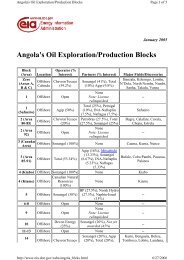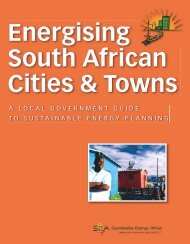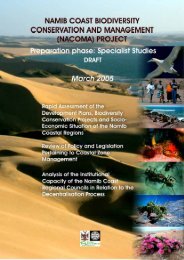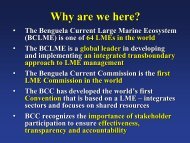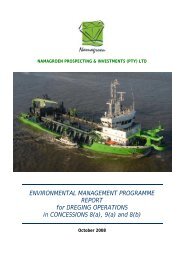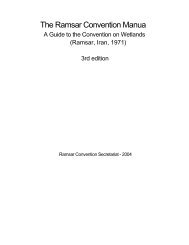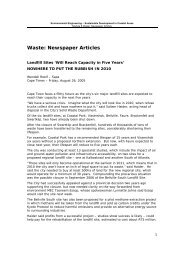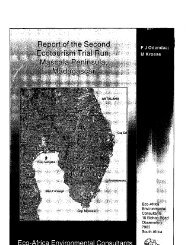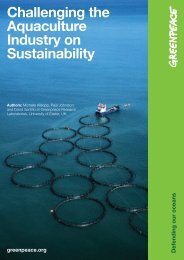Feasibility Study of Proposed Tourism Dev in Shewula, NE ...
Feasibility Study of Proposed Tourism Dev in Shewula, NE ...
Feasibility Study of Proposed Tourism Dev in Shewula, NE ...
You also want an ePaper? Increase the reach of your titles
YUMPU automatically turns print PDFs into web optimized ePapers that Google loves.
Chapter 9 - The Way Forward<br />
9.4. GE<strong>NE</strong>RAL GUIDING STATEMENTS<br />
• Improve community participation: Community members should be given<br />
opportunities to become more <strong>in</strong>volved <strong>in</strong> future <strong>in</strong>itiatives. Community<br />
participation should be <strong>in</strong>creased towards levels <strong>of</strong> full community ownership. This<br />
<strong>in</strong>crease <strong>in</strong> community participation should contribute towards achiev<strong>in</strong>g<br />
susta<strong>in</strong>ability <strong>of</strong> the tourism development project. For <strong>in</strong>stance, <strong>in</strong>terested<br />
<strong>in</strong>dividuals should be given access to resources (eg. tra<strong>in</strong><strong>in</strong>g and <strong>in</strong>formation) that<br />
will assist them <strong>in</strong> becom<strong>in</strong>g more <strong>in</strong>volved <strong>in</strong> the development process.<br />
• Improve communication: For the purposes <strong>of</strong> effective participatory plann<strong>in</strong>g,<br />
effective communication between all role-players and stake-holders is necessary.<br />
Improved communication will also contribute towards improved decision-mak<strong>in</strong>g,<br />
and facilitate the dissem<strong>in</strong>ation <strong>of</strong> <strong>in</strong>formation between all l&APs. For <strong>in</strong>stance, the<br />
relationship between the SGRT and the <strong>Shewula</strong> community must be clarified, <strong>in</strong><br />
order that channels exist for accountability and good communication.<br />
• Provide opportunities for improved community awareness: To improve<br />
community understand<strong>in</strong>g requires time and access to resources (eg. fund<strong>in</strong>g,<br />
tra<strong>in</strong><strong>in</strong>g and expertise). The community should be given the opportunity to<br />
understand the concepts <strong>of</strong> tourism and conservation, which are foreign to them,<br />
at their own pace. This process, aimed at both <strong>in</strong>dividuals and the broader<br />
community, can be achieved by us<strong>in</strong>g tools that will provide community members<br />
with the opportunity to engage with the current development process. Such tools,<br />
for <strong>in</strong>stance, could <strong>in</strong>clude workshops where community members can address<br />
their questions and issues.<br />
• Undertake future plann<strong>in</strong>g towards susta<strong>in</strong>ability: Future plann<strong>in</strong>g <strong>in</strong> the<br />
<strong>Shewula</strong> community should, be aimed at maximis<strong>in</strong>g community participation.<br />
Improved communication and awareness among community members should<br />
assist <strong>in</strong> this process. To aim for susta<strong>in</strong>ability, the plann<strong>in</strong>g should reflect<br />
<strong>in</strong>tegration, participation and consideration <strong>of</strong> alternatives. This report can be used<br />
as a basel<strong>in</strong>e <strong>in</strong>formation document for future developments.<br />
• Limit outside <strong>in</strong>tervention: To contribute towards the susta<strong>in</strong>ability <strong>of</strong> the<br />
project, outside <strong>in</strong>tervention should be limited. Where outside <strong>in</strong>tervention is<br />
necessary, it is recommended that a pr<strong>in</strong>ciple <strong>of</strong> cont<strong>in</strong>uity be followed. This<br />
entails that an outside party is kept <strong>in</strong> the process for an extended period, <strong>in</strong> order<br />
that they may rema<strong>in</strong> familiar with the situation. This will avoid 'snap-shot' <strong>in</strong>put<br />
from outside consultants, which is usually dislocated from the local development<br />
process, is not participatory and avoids build<strong>in</strong>g capacity on a local level.<br />
• Future project schedul<strong>in</strong>g: The schedul<strong>in</strong>g <strong>of</strong> development projects <strong>in</strong> <strong>Shewula</strong><br />
should take <strong>in</strong>to account the local context and understand<strong>in</strong>g <strong>of</strong> 'time'. It is<br />
important that community members and role-players familiar with the <strong>Shewula</strong><br />
context are <strong>in</strong>volved <strong>in</strong> the formulation <strong>of</strong> project schedul<strong>in</strong>g, as they will best be<br />
able to attach time expectations to project tasks.<br />
• Future fund<strong>in</strong>g for plann<strong>in</strong>g and development: Fund<strong>in</strong>g for future development<br />
plann<strong>in</strong>g should be directed at maximis<strong>in</strong>g capacity <strong>of</strong> local community members,<br />
<strong>in</strong> order that they may take on more ownership <strong>of</strong> the project.



